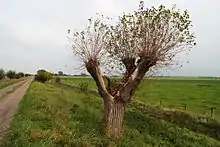pollard
See also: Pollard
WOTD – 29 June 2008
English
Etymology
From Middle English poll (“pate, scalp”) + -ard. The coin sense derives from the original penny's uncrowned obverse bust, as opposed to the laurel-wreathed form appearing on the rosary. The verb derives from the noun.
Noun
pollard (plural pollards)

A pollard willow.
- (often attributive) A pruned tree; the wood of such trees.
- 1869, Richard Doddridge Blackmore, Lorna Doone, Chapter 65,
- Only a little pollard hedge kept us from their blood-shot eyes.
- 1903, Howard Pyle, The Story of King Arthur and His Knights, Part III, Chapter Third, page 116
- And at this place there was a long, straight causeway, with two long rows of pollard willows, one upon either hand.
- 1869, Richard Doddridge Blackmore, Lorna Doone, Chapter 65,
- A buck deer that has shed its antlers.
- A hornless variety of domestic animal, as cattle or goats.
- (obsolete, rare) A European chub (Squalius cephalus, syn. Leuciscus cephalus), a kind of fish.
- (now Australia) A fine grade of bran including some flour.
- (numismatics, historical) A 13th-century European coin minted as a debased counterfeit of the sterling silver penny of Edward I of England, at first legally accepted as a halfpenny and then outlawed.
Verb
pollard (third-person singular simple present pollards, present participle pollarding, simple past and past participle pollarded)
- (horticulture) To prune a tree heavily, cutting branches back to the trunk, so that it produces dense new growth.
- 1910, Edward Morgan Forster, Howards End, Chapter 11,
- I didn't know one could pollard elms. I thought one only pollarded willows.
- 1910, Edward Morgan Forster, Howards End, Chapter 11,
This article is issued from Wiktionary. The text is licensed under Creative Commons - Attribution - Sharealike. Additional terms may apply for the media files.